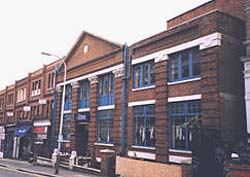Decca Records
Decca Records
One of the most famous record labels of the Swing era was the Decca Record Company, remembered for its Jazz, Swing, and popular music recordings. Compared to Victor, EMI, or Columbia, Decca got a late start, but it quickly made up for lost time.
The Decca trade name was first used in 1914 for a portable gramophone manufactured by a company Barnett Samuel & Sons Ltd., called the Dulcephone. Many of these machines were used to provide entertainment to British soldiers in the trenches during World War I. Later, Barnett Samuel and Sons changed its name to Decca. There were actually two branches of Decca, the first established in England and the second some years later in the United States. Edward Lewis established the Decca Record Company in England in 1929. Lewis remained the chairman of the company until his death in 1980.
English Decca achieved international recognition after World War II when it introduced an improved disc that used what it called full frequency range recording (FFRR). These records were recorded using improved recording equipment, and were as good or better than the LP and 45-rpm records that appeared in 1948 and 1949. FFRR was not as catchy as the term high fidelity, so the name did not catch on, but record collectors appreciated the improved sound quality.
In 1934, five years after the establishment of the British company, Jack Kapp started the American branch of Decca. The new label released its first product in the middle years of the Great Depression, and tried to appeal to cost-conscious consumers by selling records for a mere 35 cents each. The first recording artist signed by Kapp for the new label was Bing Crosby. Crosby became a major star by the end of the 1930s. Soon Kapp had also signed such celebrities as Guy Lombardo, Ted Lewis, Ethel Waters, the Dorsey Brothers, the Mills Brothers, the Casa Loma Band, and others. By 1946, Kapp’s leadership and entrepreneurial skills transformed Decca into a thirty million dollar-a-year business.
Success had its price. In 1959 American Decca had become so valuable it was purchased by the Music Corporation of America (MCA). Records with the Decca brand name appeared for a few more years, but soon this familiar label became part of recording history, at least in the United States. The label continued in Brittain releasing, among other titles, the early hit recordings of the Rolling Stones.
